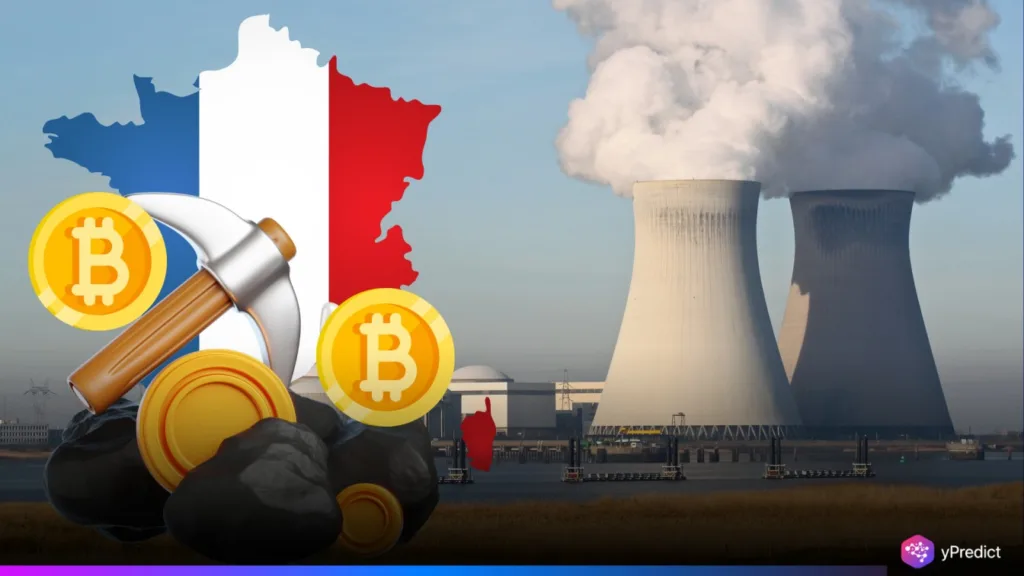
France’s political landscape is taking an unexpected turn toward crypto innovation. The far-right opposition party, Rassemblement National (RN), has proposed harnessing surplus nuclear energy for Bitcoin mining. With 56 nuclear reactors supplying nearly 70% of the nation’s electricity, RN suggests using just one gigawatt of excess power could generate between $100 million and $150 million annually. The plan, reported by Coinpedia in 2025, signals a sharp pivot in RN’s stance—from crypto opposition in 2016 to strategic adoption now. As energy costs surge and grid demands fluctuate, France sees crypto grid integration as a solution worth exploring.
RN Proposes Bitcoin Mining to Monetize Nuclear Surplus
RN leaders believe France can capitalize on its nuclear infrastructure to create new revenue channels. With a strong nuclear base already in place, the move requires minimal structural upgrades. RN argues that this strategy transforms idle energy into economic value without adding carbon emissions, presenting a sustainable angle often absent in traditional mining debates.
Coinpedia’s latest analysis projects $100–150 million in annual earnings from just one gigawatt of redirected power. RN sees this as a practical hedge against rising energy costs and an opportunity to position France as a leader in Europe’s digital asset race. The party also highlighted that using nuclear-generated power sidesteps typical criticisms around Bitcoin mining’s carbon footprint.
Crypto Grid Alignment Could Stabilize National Energy Flow
The crypto grid concept—where mining activities sync with grid conditions—has gained traction globally. Studies, including a 2022 paper from the National Bureau of Economic Research, suggest mining operations can absorb excess energy and pause during high demand, effectively acting as a buffer for the power grid. France’s proposal echoes this model.
RN’s proposal aims to make Bitcoin mining a controllable, flexible load on the national grid. In doing so, they are aiming to balance the performance of the grid, curtail waste, and improve energy use. This strategy reflects the energy-first approach seen in various regions in the U.S. and Canada because miners are signing contracts with energy providers to be a load-balancer when energy is in excess and during emergencies.
Energy Price Hikes Spark Political and Economic Recalibration
The timing of RN’s crypto pivot is strategic. France faces an increase in energy taxes, with VAT on energy jumping from 5.5% to 20% as of August 2025. As household and industrial consumers feel the pressure, political solutions are under scrutiny. RN’s Bitcoin mining proposal aims to offset public concern by offering an innovative use of surplus energy that brings economic returns.
While the RN has historically been one of the most vocal critics of cryptocurrency due to yet another perceived lack of regulatory framework and worry over economic volatility, it stands as a proponent of technological innovation now, or at least as a sensible economic option. There is some plausibility to its assertions by using infrastructure that already exists and is currently popular in society. Furthermore, it can be seen as an unexpected pragmatism in the current discussions of energy and public finances in France.
France Signals Changing Attitude Toward Crypto and Innovation
The move from crypto skepticism to digital asset exploration marks a broader change in how national politics approach innovation. RN’s embrace of Bitcoin mining underscores a willingness to blend traditional energy resources with modern digital economies. France, historically slow in accepting crypto, is now actively piloting models to make blockchain interoperability with state infrastructure.
Critics rightly note that resource intensity in proof-of-work systems should be noted. RN believes that France’s unique energy mix, dominated by nuclear, makes this concern less serious. France has a high ratio of nuclear kw/h emissions with reliable base capacity, which lends itself to cleaner mining and can serve as an operating model for other countries.






